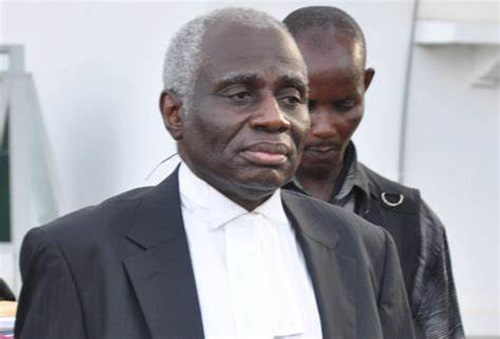A renowned lawyer and statesman, Tsatsu Tsikata, has challenged the electorate to demand from political parties how they intend to fund the lofty promises in their manifestos when they win power in this year’s election.
Delivering a lecture at the Leadership Dialogue Series in Accra yesterday, Mr Tsikata said looking at the country’s current economic challenges, it was incumbent on the political parties to tell voters about their funding plans.
“What I am interested in is some discussion of the resources that are going to be potentially available to the nation, and how the resources will be mobilised to implement the promises in the manifestos. I will be interested in the realism of the promises based on the potential resources" he said.
He, therefore, warned political parties not to take Ghanaians for granted and think that they could just make promises for the sole purpose of winning votes.
“Empty promises are worthless to the electorate, and even if they seem to win votes, the time of reckoning will come and you end up being found wanting,” he said.
He said although he was yet to read any of the manifestos, he knew they might not be a departure from past manifestos, with recycled promises which “were not fulfilled in the past and may never be fulfilled.”
Dialogue series
The Leadership Dialogue Series is a civic education platform where distinguished individuals share their perspectives on national issues to promote social transformation.
It is organised by the Centre for Social Justice (CSJ), a civil society organisation.
The 14th edition was on the theme: “Can Ghana Rise from the Ashes? Governance, Economic Transformation & Human Development in Focus.
Deeper crisis
Mr Tsikata, who is also a former Chief Executive Officer of the Ghana National Petroleum Corporation (GNPC), said Ghana was currently in ashes due to the current economic challenges, which he described as “deep crisis.”
He attributed the current economic challenges to what he described as bad policies and indecisions by the government, which, he said, led to an aggravated debt spiral, making the country worse off.
For instance, he said, the government made it seem as if going to the International Monetary Fund (IMF) for support was against the national interest and rather continued to borrow from the Eurobond market, which came with unfavourable interest rates as compared to the IMF.
“Now what has been particularly difficult for me to understand was that we waited so long in going to the IMF even though the cost of borrowing from that source is so much less than the cost of borrowing from the Eurobond market,” he said.
Mr Tsikata said there was no justification for the government to have waited so long in going to the IMF since that option offered better funding terms and that the time the government finally decided to seek the IMF support, the country was in a messy economic situation and in a weaker negotiating position.
“We continued borrowing, in effect, to pay back previously borrowed money because we were not generating enough from the previous borrowing to pay back that money. A vicious debt spiral. It was also obvious that the escalating debts were not being used productively to generate additional value for the country,” he said.
Solutions
On how Ghana could come out from its current challenges, Mr Tsikata said the country needed to learn lessons from previous economic challenges and how the country came out of it.
He mentioned the policies that were implemented as a result of the economic recovery programme (ERP) during the economic crisis in the 1980s, which he said, not only resuscitated the economy but also formed the basis for further economic growth.
He said the most important lesson the country could learn from that era was the mobilisation of all Ghanaians to help in the recovery.
“The real impetus for economic recovery, however, I would suggest, came from the mobilisation of the nation at large in support of the needed measures and the restoration of the confidence of Ghanaians in the prospects of the nation,” he said.
Again, he suggested that the country must effectively harness its natural resources such as gold, cocoa and oil and ensure that they were utilised properly for the benefit of the people and for sustainable development.
“If we are going to rise, we are not going to rise by creating more ashes. It is clear to me that resources and the value associated with those resources are important if we seek to rise from the ashes,” he added.
Sad situation
The chairman for the event and a former Presidential Advisor, Dr Christina Amoako-Nuamah, said over the years, the country had lost its moral fabric, leading to an integrity crisis.
She described as a sad situation the perception that in order to get ahead in life, one needed to be corrupt or dishonest in the country.
For his part, the Chairman of the CSJ, Dr Sodzi Sodzi-Tettey, said his outfit offered a non-partisan platform for the discussion of issues of national interest.
Writer’s email: emma.hawkson@graphic.com.gh

